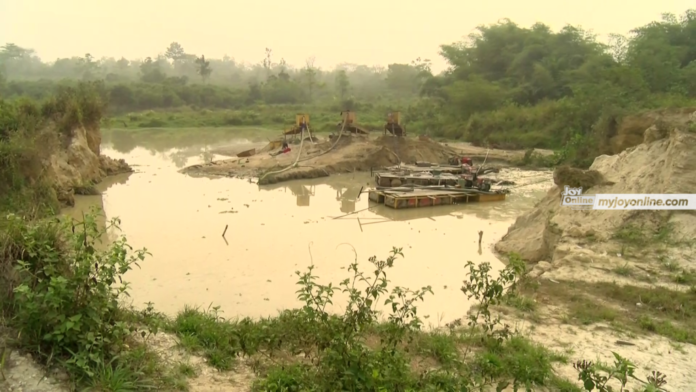Ghana, a country rich in natural resources and Africa’s second-largest, as well as the world’s 10th largest gold exporter, has been grappling with the challenges of galamsey—a local term for illegal mining.
This phenomenon has not only ravaged the environment but also ensnared citizens. The allure of quick wealth and the lack of alternative livelihoods have led many Ghanaians to engage in this hazardous activity.
Research has shown that galamsey has severe consequences on the physical and mental health, education, and socio-economic well-being of Ghanaians. Exposure to toxic substances, physical harm, and mental health concerns are just a few of the health risks associated with galamsey. Moreover, the activity perpetuates a cycle of poverty, as younger individuals are often exploited and paid meager wages.
Galamsey has been a part of Ghana’s history, dating back to the pre-colonial era. However, the recent surge in illegal mining activities has reached catastrophic proportions, severely degrading natural resources and posing a significant risk of permanent environmental, economic, and social harm to the nation.
Since 1989, multiple governments have attempted to tackle the galamsey menace, but their efforts have been largely ineffective, leaving the problem persistent and pervasive. Despite previous failures, there is a growing momentum for the current government to take decisive action against galamsey.
A chorus of concerned voices, including the Christian Council of Ghana, the Ghana Catholic Bishops’ Conference, organized labour, civil society groups, and numerous well-meaning Ghanaians, are urging the government to adopt a comprehensive and sustainable approach to mitigate this persistent menace.
In a renewed bid to combat the galamsey menace, the President of Ghana has dispatched a joint police-military task force to various illegal mining sites across the country. However, a significant segment of the Ghanaian populace remains doubtful about the effectiveness of this strategy, citing past failures.
Numerous documentaries and reports have exposed a disturbing trend of complicity, where some of the deployed officers have been compromised by accepting bribes from galamsey operators. Instead of fulfilling their mandate to enforce the law and prevent illegal mining, these officers have been co-opted into providing protection services to the very individuals they were meant to apprehend.
Some politicians cannot be left out. Allegations persist that certain politicians are complicit in Ghana’s galamsey crisis, with reports suggesting ownership of vast lands where illegal mining occurs, support for galamsey operations, and financial interests in mining activities. This conflict of interest undermines efforts to combat galamsey.
It is also noteworthy that in some communities, the incidence of galamsey is remarkably low. This can be attributed to the proactive stance taken by their traditional authorities, who have issued explicit directives prohibiting the practice of galamsey within their jurisdictions. As a result, the residents of these communities have been spared the detrimental effects of this illicit activity, and their areas have been protected from the environmental degradation and social ills associated with galamsey. Hence, some individuals are suggesting that empowering our traditional authorities may be more effective than depending on politicians and security task forces.
In a bold move, Asantehene Otumfuo Osei Tutu II recently destooled three chiefs implicated in galamsey activities. While some argue that the action came too late, others welcome the decisive step. Many now urge other traditional leaders to follow the Asantehene’s exemplary leadership, demonstrating a collective commitment to combating the illicit mining menace and protecting Ghana’s natural resources.
The negative consequences of galamsey far outweigh its perceived advantages, necessitating swift and decisive action from stakeholders to mitigate its effects, rather than actively participating in it. It has become necessary to restore the integrity of Ghana’s environment and ensure the well-being of its citizens. Ghana is at a crossroads, and doing nothing is no longer an option.
— Yayra Lawoe, Intern, Adom Newsroom


